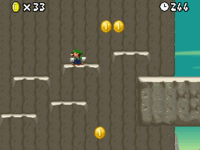Cliff
- This article is about the recurring platform that juts out of background mountainsides. For the world in Donkey Kong Country Returns, see Cliff (world).
| Cliff | |||
|---|---|---|---|
Sprite from New Super Mario Bros. Wii | |||
| First appearance | New Super Mario Bros. (2006) | ||
| Latest appearance | New Super Mario Bros. Wii (2009) | ||
| |||
| |||
Cliffs,[1] also referred to as edges[1] or ledges,[2][3] function as narrow platforming strips in the mountainous levels of New Super Mario Bros. and New Super Mario Bros. Wii. The player character's movement is restricted while they are on cliffs. While on top of them, the player character can only sidestep and jump in low arches. No other moves are available. The player character can also cling to the bottom of cliffs and shimmy back and forth. Flicking upward on the control stick brings them on top of the cliff, and vice versa.
The movement options on cliffs are similar to the ones in Super Mario 64 DS, from which the original New Super Mario Bros. heavily derives. In New Super Mario Bros. U, rocky walls inherit the function of cliffs at their tops and are recognized as the same object in the game's section in the Super Mario Bros. Encyclopedia.[4] The way player characters cling to the horizontal poles that emerge from Pole Blocks in Super Mario Bros. Wonder is also similar to cliffs.
History[edit]
New Super Mario Bros.[edit]

Cliffs first appear in the mountainous World 6 and specifically appears in World 6-1 and World 6-4. In World 6-1, the cliffs bridge distant ground in narrow corridors. Bill Blaster Turrets launch Bullet Bills directly above the cliffs, necessitating the player character either hop or swing downward to avoid being hit. One of the level's Star Coins is only collectible when the character is clinging down from a cliff. The cliffs in World 6-4 go through Fire Bars of various lengths, which makes avoiding them challenging. Smaller strips of cliff and be jumped between to collect coins and reach the Warp Pipes needed to reach the level's final Star Coin and pole. Cliffs subsequently appear in the volcanic level World 8-7, within a narrow corridor connecting two strips of land.
New Super Mario Bros. Wii[edit]
In New Super Mario Bros. Wii, cliffs appear in the coastal level World 4-2 and the mountainous World 6, where they appear in Wordl 6-1 and World 6-5. Rocky walls feed directly into cliffs in some instances. In World 4-2, the cliffs occur in narrow corridors and overhang water with leaping Cheep Cheeps. Some of the cliffs feed into yellow ledges, a variant that drops if clung to or stood on for too long like Donut Blocks. In World 6-1, stretches of cliff extend underneath rock-dropping Stone Spikes and directly below traveling Bullet Bills. The center of the level, all of the collectible Red Coins appear on top of cliffs. In World 6-5, strips of cliff overhang fluctuating tides and a leaping Porcupuffer.
Gallery[edit]
Names in other languages[edit]
| Language | Name | Meaning | Notes |
|---|---|---|---|
| Japanese | 崖[5] Gake |
Cliff | Shared with rocky walls in New Super Mario Bros. U |
| Italian | Precipizio[6] | Cliff | New Super Mario Bros.; shared with rocky wall in New Super Mario Bros. U |
| Strapiombo[7] | Overhang | New Super Mario Bros. Wii |
References[edit]
- ^ a b Nintendo (2006). New Super Mario Bros. Instruction Booklet (PDF). Redmond: Nintendo of America. Page 20.
- ^ Knight, Michael (2010). Nintendo DS Pocket Guide. Roseville: Prima Games. ISBN 978-0-307-46760-7. Page 7.
- ^ Bueno, Fernando (2009). New Super Mario Bros. Wii: PRIMA Official Game Guide. Roseville: Prima Games. ISBN 978-0-307-46592-4. Page 110, 112, 113, 123.
- ^ Sakai, Kazuya (Ambit), kikai, Akinori Sao, Junko Fukuda, Kunio Takayama, and Ko Nakahara (Shogakukan), editors (2015). "New Super Mario Bros. U" in 『スーパーマリオブラザーズ百科: 任天堂公式ガイドブック』. Tokyo: Shogakukan (Japanese). ISBN 978-4-09-106569-8. Page 215.
- ^ ---- (2015). 『スーパーマリオブラザーズ百科: 任天堂公式ガイドブック』. Tokyo: Shogakukan (Japanese). Page 118, 149.
- ^ November 15, 2018. Super Mario Bros. Enciclopedia. Magazzini Salani (Italian). ISBN 889367436X. Page 118.
- ^ November 15, 2018. Super Mario Bros. Enciclopedia. Magazzini Salani (Italian). ISBN 889367436X. Page 149.

